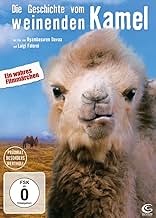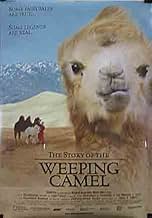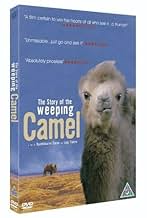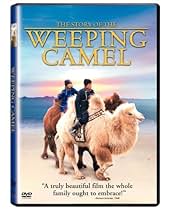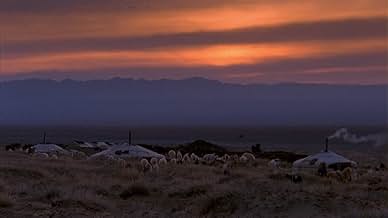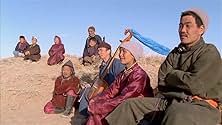IMDb RATING
7.4/10
6.5K
YOUR RATING
When a Mongolian nomadic family's newest camel colt is rejected by its mother, a musician is needed for a ritual to change her mind.When a Mongolian nomadic family's newest camel colt is rejected by its mother, a musician is needed for a ritual to change her mind.When a Mongolian nomadic family's newest camel colt is rejected by its mother, a musician is needed for a ritual to change her mind.
- Directors
- Writers
- Stars
- Nominated for 1 Oscar
- 10 wins & 9 nominations total
- Directors
- Writers
- All cast & crew
- Production, box office & more at IMDbPro
7.46.5K
1
2
3
4
5
6
7
8
9
10
Featured reviews
A Cinematic Tour De Force
If you are fed up with Hollywood glitz and special effects. If you are tired of hearing overpaid actors whining about how hard life is when having to film away from home, then you would be a fool not to watch this splendid film.
It would be too easy to say it is a documentary or a drama documentary. It is neither. It is, in the old term, 'cinema verite' at its best with good editing. Or even 'fly on the wall'. It is a truly wonderful story that has what many films should have: a beginning, a middle and an end.
I see no point in over analysing components of the film. To do so would destroy the theme. It is a story told in in the style of Aesop but it is far from a fable. The camera work (from a novice!) is stunning. There are no wild hand-held camera angles, just luscious close ups and exquisite panoramic views. Thankfully there are no blurred short depth of field shots - as is common in too many modern films.
It will leave you with a warm glow and hopefully raise many questions about the values that we as a human race share and are losing. If you have seen the Korean "The Way Home" you will love this contribution to the world of film. It is a truly excellent and heart warming experience.
It would be too easy to say it is a documentary or a drama documentary. It is neither. It is, in the old term, 'cinema verite' at its best with good editing. Or even 'fly on the wall'. It is a truly wonderful story that has what many films should have: a beginning, a middle and an end.
I see no point in over analysing components of the film. To do so would destroy the theme. It is a story told in in the style of Aesop but it is far from a fable. The camera work (from a novice!) is stunning. There are no wild hand-held camera angles, just luscious close ups and exquisite panoramic views. Thankfully there are no blurred short depth of field shots - as is common in too many modern films.
It will leave you with a warm glow and hopefully raise many questions about the values that we as a human race share and are losing. If you have seen the Korean "The Way Home" you will love this contribution to the world of film. It is a truly excellent and heart warming experience.
The Story of the Weeping Camel provides a universal message of how we all need love to survive delicately laced into the tale of a sad little camel
There's a new style of film eking into the film biz called "Narrative Documentary." What? An oxymoron you tutt-tutt silently as you read.Well, yes and no. It describes a documentary that has been embellished with narrative scenes to ultimately create the arc-drama one finds in a feature film with the intelligence of a documentary.
Narrative documentary is truly an appropriate expression for this wonderfully unique and intriguing little gem, The Story of the Weeping Camel.
As you watch the fairly simple tale of a camel that after a grueling birthing of her albino calf, she decides she's not interested in the ideas of motherhood and abandons the newborn to fend for itself.
Sounds positively dull until you start to watch this young mother and the footage the filmmakers gathered and you are pulled in - mesmerized, "How did the film crew get this?" It feels like a documentary, looks like a documentary but then there's the story obviously running along side the remarkable footage that you realize is scripted, storyboarded and a team behind the lens have planned. Amazing.
Narrative documentary is truly an appropriate expression for this wonderfully unique and intriguing little gem, The Story of the Weeping Camel.
As you watch the fairly simple tale of a camel that after a grueling birthing of her albino calf, she decides she's not interested in the ideas of motherhood and abandons the newborn to fend for itself.
Sounds positively dull until you start to watch this young mother and the footage the filmmakers gathered and you are pulled in - mesmerized, "How did the film crew get this?" It feels like a documentary, looks like a documentary but then there's the story obviously running along side the remarkable footage that you realize is scripted, storyboarded and a team behind the lens have planned. Amazing.
A captivating chapter from another civilization
We heard that National Geographic was involved with this film, so expected some first-class photography. We were not disappointed.
The setting is amongst an extended family group, eking out a simple, rural existence on the high desert plains of Mongolia. It is the end of the calving season, and the last camel in the herd remains to give birth. We are privileged to witness the event in an non-intrusive way. It is the mother's first delivery and she encounters difficulties, probably through inexperience, and the human attendants feel compelled to assist. Not easy, with such a large animal, but eventually a healthy while colt is born before our very eyes. One suspect possibly because of the human intervention, the mother rejects the little one, and brushes away its repeated attempts to feed. Before long, the offspring is isolated from the mother and herd. Its mournful wailing sounds permeate the still Mongolian atmosphere with a haunting melancholy which cannot fail to turn the viewer's heart. Repeated attempts are made to reconcile the colt and its mother. As they all fail, the family decides to embark on a traditional ceremony as a last resort. This involves engaging a violinist to play music to the pair - a solution not as easy as it sounds, for the nearest skilled musician is in a remote provincial town which is at least a decent camel ride away. He eventually arrives and the ceremony commences. The outcome is best left for the viewer, suffice to say that here we have a touching film, with the splendor of the Mongolian landscape and the soft gentle colours of its sunsets as a backdrop. Worthy of a rating of 8 out of 10.
The setting is amongst an extended family group, eking out a simple, rural existence on the high desert plains of Mongolia. It is the end of the calving season, and the last camel in the herd remains to give birth. We are privileged to witness the event in an non-intrusive way. It is the mother's first delivery and she encounters difficulties, probably through inexperience, and the human attendants feel compelled to assist. Not easy, with such a large animal, but eventually a healthy while colt is born before our very eyes. One suspect possibly because of the human intervention, the mother rejects the little one, and brushes away its repeated attempts to feed. Before long, the offspring is isolated from the mother and herd. Its mournful wailing sounds permeate the still Mongolian atmosphere with a haunting melancholy which cannot fail to turn the viewer's heart. Repeated attempts are made to reconcile the colt and its mother. As they all fail, the family decides to embark on a traditional ceremony as a last resort. This involves engaging a violinist to play music to the pair - a solution not as easy as it sounds, for the nearest skilled musician is in a remote provincial town which is at least a decent camel ride away. He eventually arrives and the ceremony commences. The outcome is best left for the viewer, suffice to say that here we have a touching film, with the splendor of the Mongolian landscape and the soft gentle colours of its sunsets as a backdrop. Worthy of a rating of 8 out of 10.
An Excellent Film of a Different Way of Life
In Mongolia in the Gobi desert a four-generation family of herders lives a tough, plain life. One of their camels gives birth but refuses to accept the calf. They care for the calf, try to hand-feed it, and decide to send for a player of music. The belief is that the music may make the camel accept the calf, and if it does the camel will weep.
The movie is classified as a documentary, but it is much more the story of the ways of this particular family, how they live, how they raise their small children, how the experience of the grandparents is used, how they care for their herds. Customs and rituals provide comfort. Electricity, television, ice cream provide temptations, but are more or less accepted as expensive facts of life which they aren't particularly tempted by. The actors all appear to be nonprofessionals.
This is the kind of movie you have to let yourself accept for what it is...a gentle, unobtrusive look at a way of life far different from ours. Well worth seeing.
The movie is classified as a documentary, but it is much more the story of the ways of this particular family, how they live, how they raise their small children, how the experience of the grandparents is used, how they care for their herds. Customs and rituals provide comfort. Electricity, television, ice cream provide temptations, but are more or less accepted as expensive facts of life which they aren't particularly tempted by. The actors all appear to be nonprofessionals.
This is the kind of movie you have to let yourself accept for what it is...a gentle, unobtrusive look at a way of life far different from ours. Well worth seeing.
Fascinating film
The Mongols are a fascinating people who at one time, conquered more of our planet than any other nation or civilization. The supreme irony in all this was that the Mongols themselves were hardly "civilized," i.e., linked to living in cities supported by extensive agricultural complexes, but were traditionally pastoralists. However, they were one of the most efficient fighting forces in history, as they swept from the Chinese coast through the Eastern Mediterranean and up to the banks of the Danube in Europe. But, little is known about these marvelous people who are ancestors to the Manchus, Koreans and Japanese of today. Here is a wonderful little tale, albeit somewhat stylized, which gives us a glimpse of Mongol pastoral life on the brink of globalization. The subtle mixture of their traditional pastoral existence, e.g., yurts, herding, gathering fuel, etc., with that of the modern, e.g., the musician brings his morinkhuur (Mongol Viola) to camp on a motorcycle to perform an ancient ritual, is marvelously done.
The Mongol Bactria's camel nomads are rather marginal to the great majority of pastoralists, many of which still herd their sheep on their stout Mongol horses. These marvelous two-humped camels are now only found in Mongolia and this film showing their continuing way of life is simply wonderful.
The Mongol Bactria's camel nomads are rather marginal to the great majority of pastoralists, many of which still herd their sheep on their stout Mongol horses. These marvelous two-humped camels are now only found in Mongolia and this film showing their continuing way of life is simply wonderful.
Did you know
- TriviaOfficial submission of Mongolia for the 'Best Foreign Language Film' category of the 76th Academy Awards in 2004.
- ConnectionsFeatured in The 77th Annual Academy Awards (2005)
- How long is The Story of the Weeping Camel?Powered by Alexa
Details
- Release date
- Countries of origin
- Official sites
- Language
- Also known as
- Ağlayan Devenin Öyküsü
- Filming locations
- Production companies
- See more company credits at IMDbPro
Box office
- Gross US & Canada
- $1,763,052
- Opening weekend US & Canada
- $21,767
- Jun 6, 2004
- Gross worldwide
- $9,328,652
- Runtime
- 1h 33m(93 min)
- Color
- Sound mix
- Aspect ratio
- 1.85 : 1
Contribute to this page
Suggest an edit or add missing content


